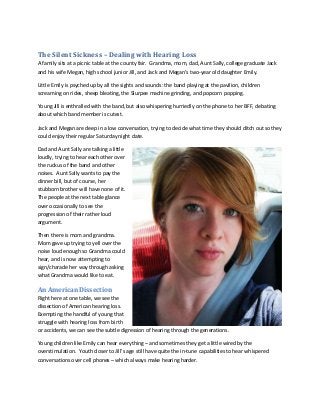
The silent sickness – dealing with hearing loss
- 1. The Silent Sickness – Dealing with Hearing Loss A family sits at a picnic table at the county fair. Grandma, mom, dad, Aunt Sally, college graduate Jack and his wife Megan, high school junior Jill, and Jack and Megan’s two-year old daughter Emily. Little Emily is psyched up by all the sights and sounds: the band playing at the pavilion, children screaming on rides, sheep bleating, the Slurpee machine grinding, and popcorn popping. Young Jill is enthralled with the band, but also whispering hurriedly on the phone to her BFF, debating about which band member is cutest. Jack and Megan are deep in a low conversation, trying to decide what time they should ditch out so they could enjoy their regular Saturday night date. Dad and Aunt Sally are talking a little loudly, trying to hear each other over the ruckus of the band and other noises. Aunt Sally wants to pay the dinner bill, but of course, her stubborn brother will have none of it. The people at the next table glance over occasionally to see the progression of their rather loud argument. Then there is mom and grandma. Mom gave up trying to yell over the noise loud enough so Grandma could hear, and is now attempting to sign/charade her way through asking what Grandma would like to eat. An American Dissection Right here at one table, we see the dissection of American hearing loss. Exempting the handful of young that struggle with hearing loss from birth or accidents, we can see the subtle digression of hearing through the generations. Young children like Emily can hear everything – and sometimes they get a little wired by the overstimulation. Youth closer to Jill’s age still have quite the in-tune capabilities to hear whispered conversations over cell phones – which always make hearing harder.
- 2. Megan and Jack are fine as well. Perhaps they’ve listened to a little too much loud music in their youth, but they still manage to hear each other whispering in close proximity. But as we skip a generation up to Mom, Dad and Aunt Sally, we start to see the hearing degradation. Dad and/or Aunt Sally might not even realize that their hearing has declined over the years. It’s a subtle thing that can be blamed on other peoples’ mumbling or the fickleness of volume controls on phones and TVs. And then we have Grandma. It’s clear that she struggles with hearing loss, but she hasn’t bothered to get much help. Offended by the idea that she needs hearing aids (that’s for old people, missy!), she has let her hearing deteriorate unimpeded. What grandma (and her family) should realize, is that hearing loss can start early. Hearing aids are not shameful, but can save you from a lot of misfortune. Missing important information at work, not hearing whispered sweet nothings from your significant other, and even missing the beeps of alarms can put at risk success, happiness, and safety. No matter what age you are, be wary of the signs of hearing loss and get treated quickly! The sooner you do, the better condition you will be in. Get yourself some invisible hearing aids, install captioned telephone service or hearing loss phones. You, and everyone around you, will be glad you did!